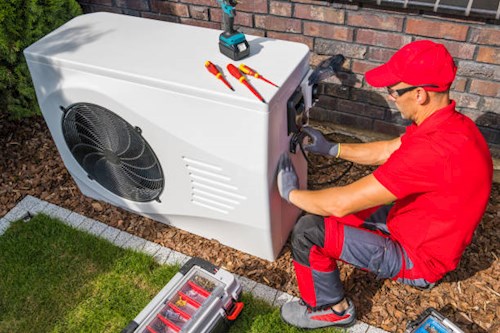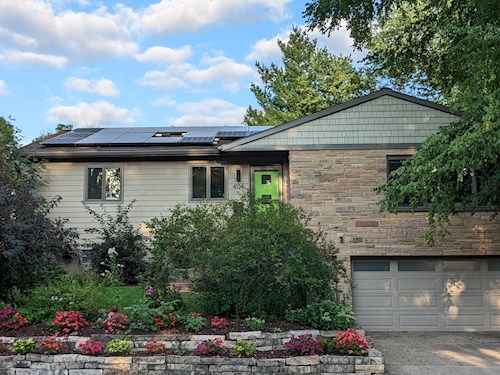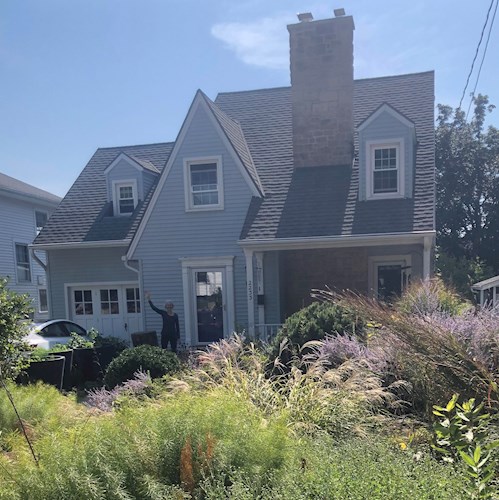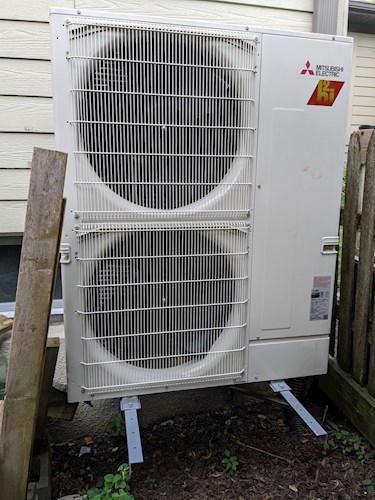

A heat pump is a heating and cooling system for homes and buildings. Heat pumps work by moving heat from one place to another, which is more efficient than the way furnaces or boilers work. An air conditioner also moves heat so you can think of a heat pump as a two-way super-efficient air conditioner.
When in heating mode, heat pumps take heat from the outside air and transfer it to the inside of your home. While in cooling mode, a heat pump takes heat from inside your home and transfers it to the outside. Because heat pumps can heat as well as cool a heat pump can replace both heating and cooling equipment in homes and buildings.

In order to reduce his future reliance on fossil fuels, Dan Williams transitioned to an air-source heat pump to heat and cool his older home.

Read about Susan Millar's impressive home energy efficiency journey to gain inspiration and learn more about heat pumps.
Focus on Energy hosts two lists of contractors who sell, install, and service heat pumps across Wisconsin. One list includes all the contractors who participate in the traditional Focus on Energy rebate programs and the other list (which is smaller) includes only the contractors who are also qualified to install heat pumps and other technologies that will qualify for the federall-funded Home Energy Rebates that Focus on Energy is administering. (This narrower list is called the list of IRA Registered Contractors.) We recommend you find a contractor via the IRA Registered Contractor list so that you are assured that your installation is eligible for both Focus on Energy and federal rebates.
And if you are an HVAC firm and you're not on the Focus on Energy list for the Home Energy Rebate programs as an IRA Registered Contractor you can sign up here.

Focus on Energy recently released an Electric Heat Pump Customer Buying and Operation Guide for Single-Family Homes. The guide explains how heat pumps work and dispels common myths about them.

Learn more from Focus on Energy about what heat pumps are, how they work, and how you can use them to make your home more comfortable and efficient.
Ductless air source heat pumps (mini splits) provide heating and cooling to a specific area of a building; these systems are often installed in new additions to a home or rooms that are not well served by the existing heating and cooling system.
Ducted air source heat pumps replace a central air conditioner, using a home’s existing duct work for cooling. These systems typically also provide efficient heat when the outside temperature is above 25 to 40 degrees Fahrenheit. That means, in our climate, these heat pumps can provide heating for much of our heating season. When households install a ducted air source heat pump they maintain a furnace that still operates on the very cold days when the heat pump is not efficient.
Cold climate air source heat pumps are designed to replace both the heating and cooling systems in your home because the heat pump is efficient to lower outside temperatures. Most cold climate heat pumps include a system for back up heat on the coldest of days.
Geothermal or ground source heat pumps leverage the temperatures underground rather than the outside air. These systems involve wells that go deep into the ground where temperatures are about 50 degrees all year. That means these heat pumps can heat and cool facilities without backup systems, even on the coldest days. Geothermal heat pumps are increasingly common in both commercial buildings and homes in Wisconsin due to the 30% tax credits available under the Inflation Reduction Act.
Today most homes in Dane County are heated by burning methane gas, a fossil fuel that contributes to climate change. Over the next decades we aim to help everyone—households, businesses, landlords—move away from fossil gases toward clean fuels like carbon-free electricity.
Heat pumps work more efficiently than traditional systems like furnaces, boilers, and central air conditioners, which means they produce fewer emissions and can save you money on your utility bills. In addition, they operate by moving air around your house so all areas of your house become more evenly heated or cooled, which translates to a more comfortable living space than traditional systems.
In Wisconsin's climate whole house heat pumps work best in very efficient homes--houses with good insulation and air sealing. Even the best cold climate heat pumps will struggle to keep a drafty home comfortable so if you are interested in a heat pump, make sure your house is well insulated and air-sealed first.
The economics of heat pumps are best in homes with a lot of cooling because the heat pump is a very very efficient air conditioner. The economics are also good if you currently heat with propane, fuel oil or electric resistance heat because the heat pump will provide comparable heat at a lower price.
In some cases consumers couple a heat pump with a rooftop solar array to reduce the added electric usage.
Now is a great time to look into transitioning to a heat pump because tax incentives from Inflation Reduction Act can help offset the cost of installation.
Read stories about Dane County residents are transitioning to a heat pumps here and here.